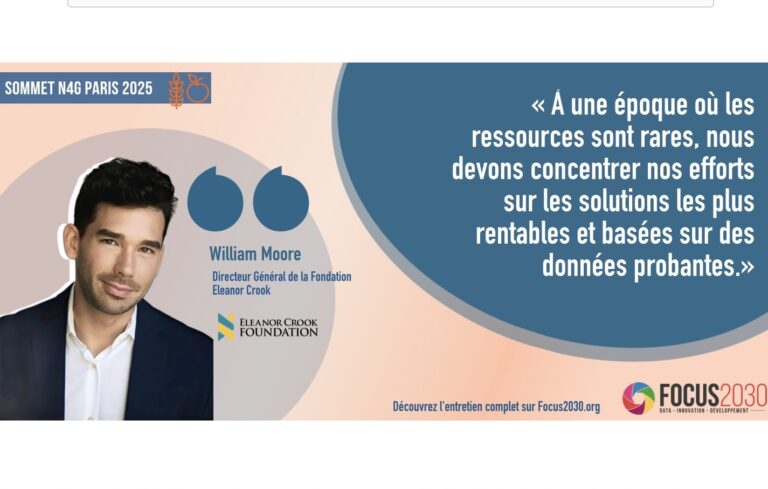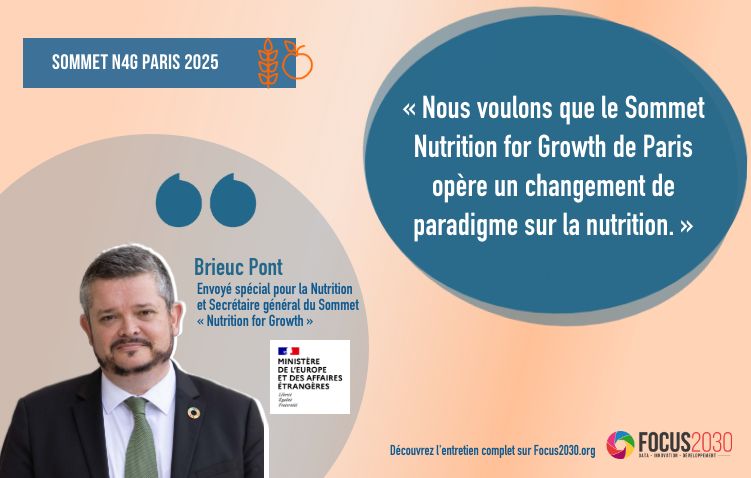SURVEY – THE FRENCH AND THE FIGHT AGAINST MALNUTRITION WORLDWIDE AT THE NUTRITION FOR GROWTH SUMMIT
Publié le 17/03/2025.
| The next edition of the Nutrition for Growth Summit, organized by France on March 27 and 28, 2025 in Paris, represents a unique opportunity to engage the international community in a more effective fight against malnutrition. Ahead of this crucial event, Focus 2030 is dedicating a special edition to the global challenges of (mal)nutrition, highlighting the views and expectations of organizations, key public figures and experts working in the field of nutrition. |
On March 27 and 28, France will be hosting the Nutrition for Growth Summit, a high-level meeting designed to mobilize the international community in the fight against the root causes of malnutrition.
In this context, Focus 2030 commissioned a survey from the YouGov institute as part of the Development Engagement Lab action-research project led by UCL and Birmingham University. This opinion poll was carried out online between February 27 and March 5, 2025, among a sample of 1,001 adults representative of the French population, using the quota method (margin of error ±2%).
The survey shows that the French, despite their imperfect knowledge of the problems and causes of malnutrition, expect France to support the fight against this scourge, both in France and in the rest of the world.
69% of French people are in favor of maintaining or increasing France’s financial commitment to the global fight against malnutrition.
While the French are particularly pessimistic about the international community’s ability to eradicate malnutrition by 2030, as it has pledged to do, they are counting on international organizations, governments and NGOs to address this global challenge, which is responsible for half of the deaths of children under the age of five worldwide.
The results of this opinion poll underscore the essential role that companies play in improving the supply of and access to healthy, high-quality food, and justify holding them accountable for progress or setbacks toward a world free of malnutrition.
What malnutrition means to the French
When asked an open-ended question about what they understand by the term “malnutrition”, respondents demonstrated a certain level of awareness of the issue,spontaneously stating that it encompassed both the quantity of food available to the greatest number, and the nutritional quality of the food available. The link between poverty, inequality, geographical disparities and the most vulnerable populations, namely children, also came to mind.
| Definition : According to the WHO, malnutrition in all its forms includes undernutrition (wasting, stunting, underweight), vitamin or mineral deficiencies, overweight, obesity and diet-related non-communicable diseases. |
The major global challenge that worries the French the most : the possibility of global conflict
Asked in the midst of the turmoil caused by Donald Trump’s statements and the United States’ reversal on Ukraine, respondents ranked war and conflict, climate change, the state of the global economy and access to healthcare among the major global challenges that concern them the most.
Hunger and malnutrition ranked 5th, demonstrating a continued awareness of the issue without necessarily being linked to a “hot” news story.
The French and the causes of world hunger : fairly accurate perceptions
While the French are particularly concerned about conflict, they also rightly see conflict as the main cause of world hunger. Lack of access to water and lack of political will on the part of governments are among the second and third main causes of hunger respectively.
Although the lack of ethical commitment on the part of agri-food companies ranks last in the list of causes of malnutrition, respondents appear to be aware of the sector’s potential negative externalities, as evidenced by their willingness to boycott companies with harmful practices (see question on modes of engagement below).
France’s commitment to combating malnutrition worldwide : a clear public aspiration
In the run-up to the Nutrition for Growth Summit, which aims to secure political and financial commitments to combat malnutrition, the French seem to have chosen which side they are on.
Despite the current economic climate, 69% of French people say they are in favor of maintaining or increasing France’s financial commitment to fight malnutrition worldwide. Only 16% are opposed.
Like in other countries, fighting malnutrition is important in France
On a domestic scale, the French also favor, in similar proportions, increasing or maintaining financial commitments for this issue. Only 10% favor a decrease.
Lack of awareness of the extent of malnutrition worldwide
To grasp the level of public knowledge, half the panel was asked about the proportion of countries affected by malnutrition worldwide, while the other half was asked about the number of countries with overweight and obese populations.
The French underestimate the extent of malnutrition worldwide
When asked about the prevalence of malnutrition worldwide, only 8% of the panel considered that all countries are affected, and 22% that most countries are concerned.
In fact, malnutrition – in all its forms – affects every country in the world, regardless of wealth. Undernutrition and micronutrient deficiencies are particularly prevalent in developing countries, while overweight and obesity are more prevalent in industrialized countries. However, these two trends are now converging in a growing number of countries, giving rise to the “double burden” of malnutrition.
Awareness of the global prevalence of overweight and obesity
When it comes to overweight and obesity worldwide, the French are aware of the global nature of these two issues : 86% believe that one in two country, or more, is concerned.
In fact, overweight and obesity are health problems that are affecting more and more countries around the world, but their prevalence varies considerably according to region, country and socio-economic group.
A recent study published in The Lancet reveals that this public health issue is progressing rapidly. According to IHME projections, obesity and overweight could affect more than half of adults (60%) and one third of children and adolescents by 2050.
Do the French believe that it is impossible to eradicate malnutrition by 2030 ?
73% of respondents said they were rather pessimistic (49%) or very pessimistic (24%) about the international community’s ability to eradicate malnutrition by 2030, i.e. to achieve the nutrition-related target of Sustainable Development Goal 2 on the fight against hunger.
In fact, the world is not on track to meet SDG 2, and the state of nutrition worldwide is a cause for concern. The United Nations estimates that more than 600 million people worldwide will be suffering from hunger by 2030, while obesity could affect 1.2 billion adults worldwide in 2030, compared with 880 million in 2022.
Who can make a difference in the fight against global malnutrition ?
International organizations, governments and NGOs are perceived by citizens to be best placed to tackle this scourge when asked which stakeholders are most likely to make a difference in the fight against malnutrition.
The governance of the Nutrition for Growth Summit relies on the mobilization of all stakeholders working towards the elimination of malnutrition, including governments from both the Global North and South, international organizations and NGOs, as well as foundations, the research sector and the private sector. It should be noted that in order to participate in this collective approach, private companies are required to respect certain conditions or “principles of engagement” that encourage compliance with good ethical and nutritional practices.
Food companies’ action to combat malnutrition : a question of responsibility
Most French people believe that agri-food companies have a role to play in improving their practices, even though companies are ranked as the fifth most important stakeholder in the fight against malnutrition worldwide.
It’s as if the French hold companies more accountable for preventing malnutrition than for the health consequences caused by their activities.
In particular, a large majority of respondents expect food companies to :
- provide healthier, balanced products (84%)
- educate consumers about healthy eating (75%)
- be transparent and clearly indicate the composition of their products (85%)
Finally, a large majority of French people (61%) believe that companies should be held responsible for health problems linked to malnutrition and excessive consumption of processed foods. Only a minority are undecided (18%) or consider that the responsibility falls on companies (21%).
Private agribusiness is both the problem and the solution to the challenge of malnutrition. Thayt is why governments, international organizations and NGOs are trying to regulate the practices of the sector, reduce the negative externalities of these practices and encourage virtuous initiatives.
Civic engagement and the fight against malnutrition : a willingness to take action
Among the individual actions proposed to contribute to the fight against malnutrition on a global scale, most respondents expressed a willingness to :
- boycott companies with harmful food practices (33%)
- sign a petition on the issue (28%)
- donate to an organization that fights malnutrition (24%)
Illustrating an undeniable desire to act, only 17% of respondents said they did not wish to undertake any of the civic actions listed.
| In partnership with University College London (UCL) and the University of Birmingham, Focus 2030 is carrying out a research-action program designed to analyze citizens’ perceptions, attitudes, behaviors and feelings about international solidarity issues in four countries : France, Germany, the United States and the United Kingdom. Entitled Development Engagement Lab (DEL), this project aims to provide development players (NGOs, foundations, think tanks, ministries, public institutions, international organizations) with quantified data to enable them to better grasp citizens’ expectations when implementing their communication, mobilization and advocacy activities. |










